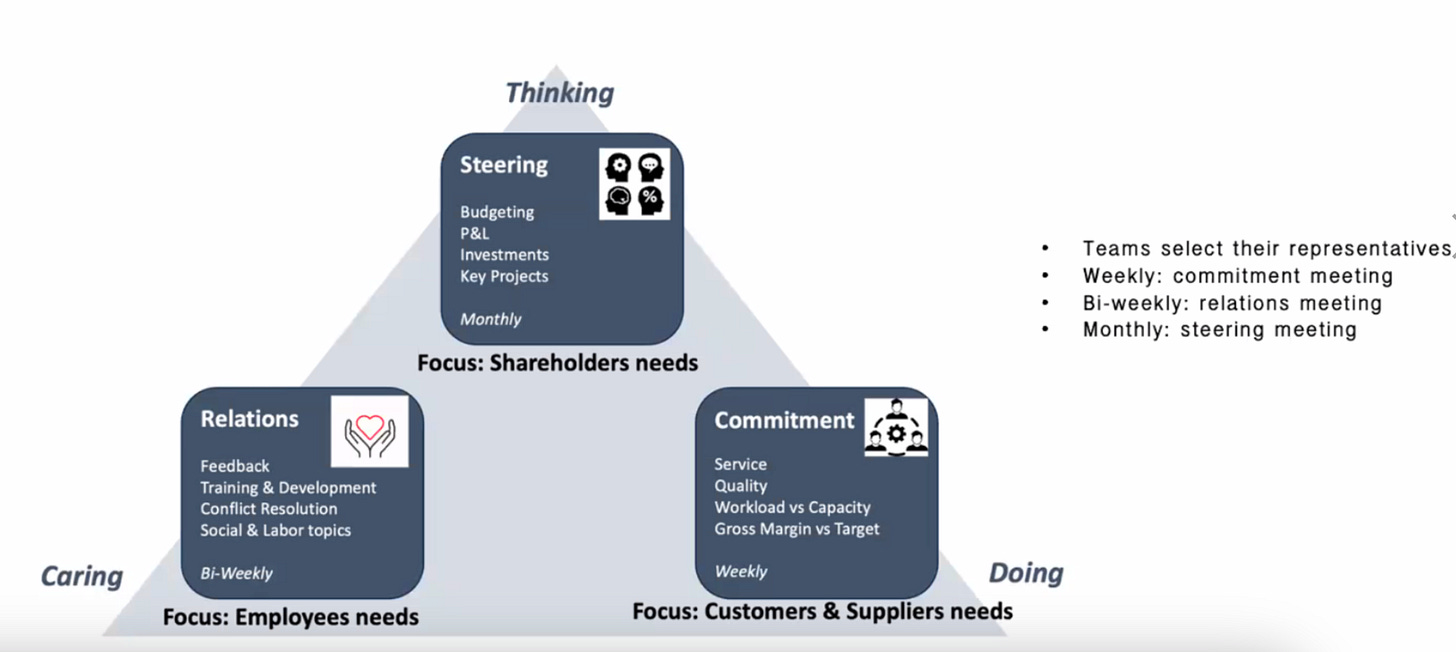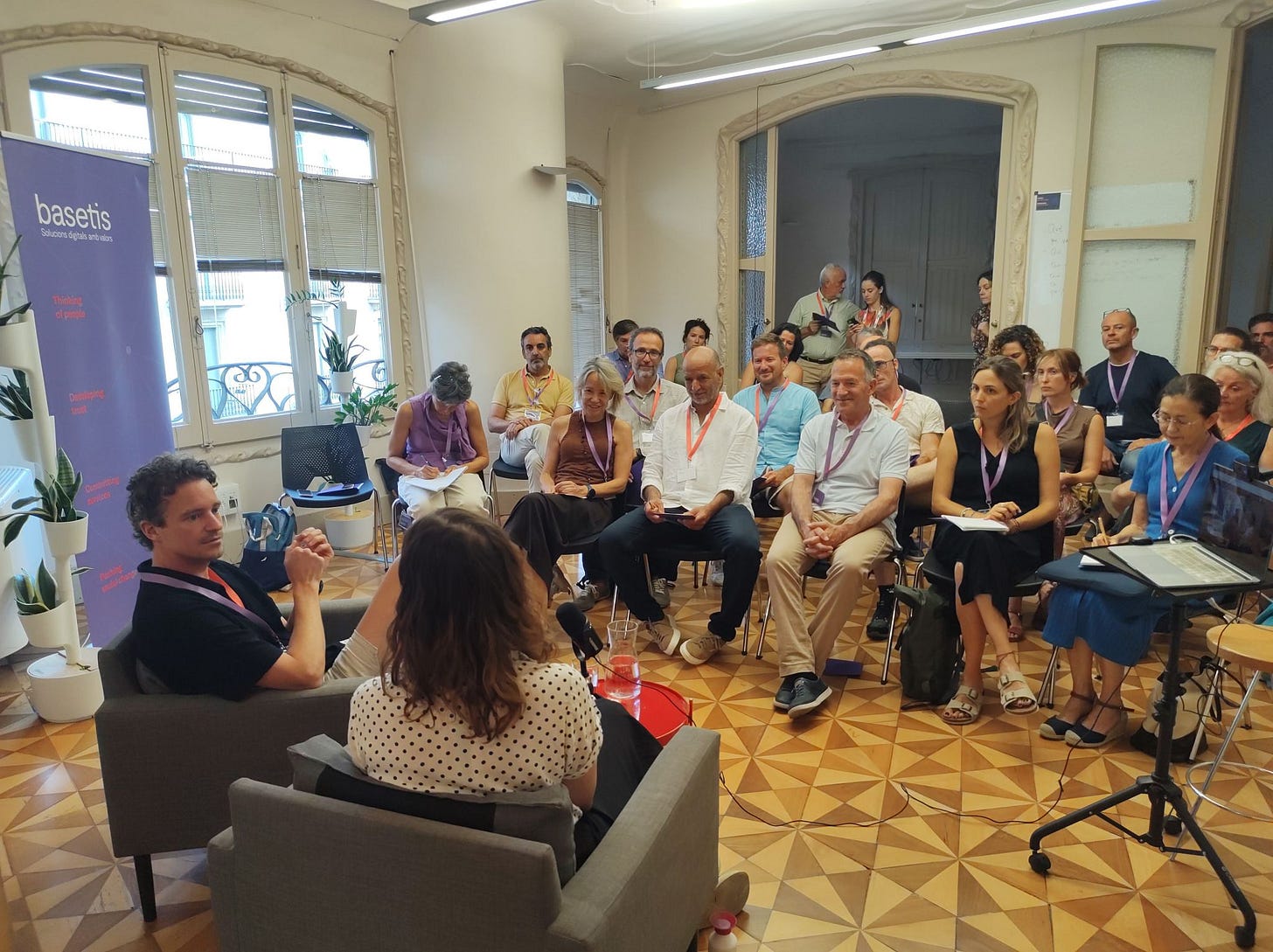State of the movement
An evening with Pim de Morree about the landscape of self-managing and progressive organisations
Last week Pim de Morree, co-founder of Corporate Rebels and Krisos, was in town for the Festival of Consciousness and so my friends at Full Circle and I organised an evening (kindly hosted at the Basetis office) for some of the progressive organisation community here in Barcelona.
Here are some of my highlights and takeaways from two hours of interview and discussion.
Different models of self-management
Many of the audience’s questions were around how to self-organise, or how to transition. Which is the ‘right’ method? Pim shared that his Corporate Rebels co-founder Joost Minnaar has been writing a new book about self-managing organisations. Joost has used anthropologist Alan Fiske’s four models of human relations to distinguish different approaches to self-organisation which are:
Authority ranking – as in traditional, top-down organisations
Market pricing – like Haier Group and their RenDanHeYi market-based organisational model
Equality matching – such as the NER approach, in which fairness and equality are achieved through practices like team-based decision-making and profit sharing
Communal sharing – for example, healthcare organisation Buurtzorg, which is built around caring for patients and employees (and founder Jos de Blok has a much larger vision of creating community-based neighbourhoods of care)
The key point here is that there is no one ‘right’ model.
As Joost writes:
“So what’s the “best” model for self-management? That’s the wrong question. Each has its strengths. Each fits a different culture, context, or industry. The real power comes not from choosing the right relational model, but from understanding which one you’re in, and being honest about it.”
One audience member asked if it’s possible to mix and match these relational styles and Pim replied yes, so long as you are consciously choosing which elements you are mixing and why.
(I also think it’s interesting, from a ‘Source lens’, that the relational model of an organisation if often a reflection of the values of the founder. For example, compare Haier’s philosopher-entrepreneur CEO Zhang Ruimin with Buurtzorg’s rebellious but big-hearted founder Jos de Blok. If each leader (or ‘Source’) values one organising principle over the others – whether it’s letting the market decide, or centring community – the organisation will naturally reflect this.)
Framework vs. dogma
Pim shared that a few years ago when asked if you should use a framework to transition to self-management, his answer would have been no. But he has seen the value that frameworks have.
However, he stated that he is more of a fan of a lightweight framework rather than something as dogmatic or ‘off-the-shelf’ as Holacracy is. (It reminds of what Chuck Blakeman said to me when I asked what he thought of Holacracy and he answered: “It’s still lipstick on a pig, it’s just a better pig!”)
The companies that his company Krisos have been acquiring and transforming apply a version of the NER framework which has been successfully applied in more than 100 companies in Spain and beyond. The NER approach features a ‘Pilotaje’ (Steering) team made up of elected representatives of other teams and a ‘Compromiso’ (Commitment) team, also made up of elected representatives, that meet to help coordinate the organisation in a decentralised way and navigate tensions together.
Krisos’ team of coaches and consultants have added to this model a third team called the ‘Caring’ or ‘Relations’ team, because they recognised something was missing when it came to taking care of the human relationships. This team supports with things like conflict resolution, feedback, and training and development. Decisions are generally made in the teams with the ‘consent’ process.

I agree that it’s helpful to have something for people to ‘step into.’ If you are going to take away management structures and processes, you need to replace them with something, otherwise you will create confusion and power vacuums. I read this paper recently by Perttu Salovaara, Johanna Vuori and David Collinson and it stresses the importance of ‘collective social practices’. They write:
“Social practices are script-like descriptions that facilitate shared work (Lee et al., 2020) and they replace traditional management functions – such as decision-making, target setting, feedback, conflict resolution or division of labour – by offering guidelines on how to act collectively in these situations.”
Public vs. private institutions
Another question in the room was about whether there is a difference between transformations in private companies versus public institutions. Pim answered that the differences are no bigger than the differences between two private companies.
He cited one of his favourite examples, the Belgian Federal Office of Social Affairs, a public sector organisation with 2,000 employees. Sadly, it looks like the organisation is slowly backsliding to its previous incarnation since the leader of this radical transformation, Frank van Massenhove, has now retired.
We talked about how with public institutions, there are a few extra challenges. As Frank himself put it, politicians are perhaps the most risk-adverse people you’ll ever meet (which is why he asked for forgiveness rather than permission!). What’s more, public institutions are often at the mercy of short-term thinking due to electoral cycles. I also shared my observation that a lot of public sector organisations (and third sector organisations in general) often have a culture of fear due to a legacy of toxic leadership, often brutal change initiatives, and a constant feeling of scarcity. It can therefore be pretty challenging to try out radical experiments in such a climate of low psychological safety. (I address this in a previous post.)
Reinventing education
David Martí, who wrote the foreword to the Spanish editions of the Reinventing Organisations books, asked a question about education. We had acknowledged that a few business schools are paying attention to progressive organisations now, but he was more concerned about early years education. It was a question he had also asked at the Reinventing Organisations 10-year anniversary event, and I thought Frederic Laloux’s response back then was interesting.
Frederic shared his theory about how parents have their own sort of Stockholm Syndrome. Essentially, in order to fully consider the possibility of enrolling their child not in a mainstream school but in something more progressive, they would have to confront the notion that they needlessly suffered through their own twelve years of education. He believes that in the same way he has created a collective grieving space for the climate crisis via The Week, we perhaps need to create spaces for parents – and teachers – to really process the pain and grief of their own educational history before we can really imagine something new.
Here’s the clip:
And perhaps the same is true of managers today. Pim likened it to his experience of a fraternity at university where senior students would inflict worse punishments on incoming pledges since they had been waiting for their chance for vengeance after what they had endured. I’ve experienced something similar with internships – former interns telling me they enjoy bossing new interns around because they had suffered the same in their time.
The current status of ‘the movement’
Finally, we discussed the current status of ‘the movement’, if we talk broadly about self-managing organisations, teal and so on. The success of the Indaero case, Krisos’ first acquisition, has been featured in mainstream media in Spain which suggests it’s still very novel. I also lamented that the tone of the press when reporting on these cases is still a little ‘freak show’, for example this BBC article about Argentinian self-managing company 10Pines. But Pim pointed out that there is still a lot of educating needed to demonstrate that self-management doesn’t mean structureless chaos and perhaps we don’t do ourselves any favours by focusing on the ‘bossless’ aspect or specific practices, such as self-set salaries.
What’s promising is that Pim and his colleagues have created perhaps the world’s largest database of self-managing companies. It’s currently at around 1,000 companies, although they need to do some filtering now as not all of them fit the criteria. The ambition is to produce a case study for every single one. (Here’s an article containing 50 such case studies.)
I certainly have the feeling since the 10-year anniversary of Reinventing Organisations event that the number of self-managing or teal organisations is increasing, and there are so many still not on our collective radar. Yes, it’s still a tiny percentage of global companies, but Pim is convinced that networks like the Rebel Cells help to create momentum by connecting companies practising new ways of working and attracting more traditional companies to take the leap.
Decentralised Leadership Bootcamp
Interested in an online programme that teaches you the mindset and skills needed for self-managing teams to thrive? Check out our new and improved Decentralised Leadership Bootcamp that starts in August 2025.
Here are some participant reviews:







